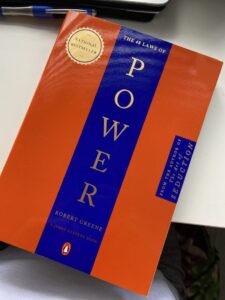Hey there, fellow power-seekers and accidental manipulators! Buckle up, because we’re about to dive headfirst into the delightfully devious world of Robert Greene’s “The 48 Laws of Power.” This book is like a self-help guide for aspiring supervillains, or maybe just that guy in accounting who always seems to get his way. Either way, it’s a wild ride that’ll make you question everything you thought you knew about success, influence, and whether or not you should trust that suspiciously friendly barista.
The Power of First Impressions (Or, How I Learned to Stop Worrying and Love My Evil Laugh)

When I first picked up this book, I half-expected it to come with a complimentary cape and a mustache-twirling kit. I mean, with chapter titles like “Crush Your Enemy Totally” and “Play on People’s Need to Believe to Create a Cultlike Following,” you’d be forgiven for thinking you’d stumbled into a supervillain’s playbook rather than a New York Times bestseller. But as I delved deeper into Greene’s Machiavellian masterpiece, I realized something profound: we’re all playing the game of power, whether we like it or not. The only difference is that some people are playing 4D chess while the rest of us are still trying to figure out how the horsey moves.
The Laws of the Jungle (Office Edition)
Greene’s laws are like a safari guide to the concrete jungle of modern life. Take Law 1: “Never Outshine the Master.” At first, I thought this meant I should deliberately botch my PowerPoint presentations to make my boss look good. Turns out, it’s more about strategic humility and knowing when to let others bask in the spotlight. Who knew that not being an insufferable know-it-all could actually be a path to success?
Or consider Law 15: “Crush Your Enemy Totally.” Before you start planning elaborate revenge schemes involving glitter bombs and mariachi bands, remember that in the professional world, “crushing” usually means outperforming and rendering irrelevant. Although, I must admit, the mariachi band idea has a certain flair to it.
The Dark Side of the Force (I Mean, Power)

Now, I know what you’re thinking. “Isn’t this all a bit… morally questionable?” And you’d be right to ask. Some of these laws make Darth Vader look like a fluffy bunny in comparison. Law 7, “Get Others to Do the Work for You, but Always Take the Credit,” is basically the unofficial motto of every group project ever.
But here’s the thing: Greene isn’t necessarily advocating for us to become mustache-twirling villains (although if that’s your aesthetic, you do you). Instead, he’s holding up a mirror to the ways power actually operates in the world. It’s like he’s saying, “Look, this is how the game is played. You can choose to play it, or you can at least understand it so you don’t get played.”
The Accidental Machiavelli: Confessions of a Reluctant Power Player
In the spirit of full disclosure, I decided to test out some of these laws in my own life. The results were… mixed, to say the least.
Law 4: “Always Say Less Than Necessary” seemed like a good place to start. I figured I’d come across as mysterious and intriguing. Instead, my attempts at being enigmatic led to a series of misunderstandings, including one memorable incident where my cryptic silence was interpreted as enthusiastic agreement to host the next family reunion. Pro tip: Sometimes, words are necessary, especially when Great Aunt Mildred is involved. I had slightly better luck with Law 25: “Re-Create Yourself.” I didn’t go full Madonna and reinvent myself every other Tuesday, but I did start introducing myself at parties as an “Underwater Basket Weaving Consultant.” It turns out people are much more interested in talking to you when they think you have niche, slightly absurd expertise. Who knew?
The Power of Laughter (Or, How I Learned to Stop Taking Myself So Seriously)

Here’s the thing about power: it’s serious business, but it doesn’t always have to be serious. Some of the most powerful people I know are those who can laugh at themselves, who can diffuse tension with a well-timed joke, or who can make others feel at ease in their presence. Greene’s laws are insightful, often accurate, and sometimes downright chilling. But they’re also a reminder that human interaction is a complex dance of motivations, perceptions, and yes, power dynamics. Understanding these dynamics doesn’t mean you have to become a Machiavellian mastermind (unless that’s your thing, in which case, please use your powers for good and not evil). Instead, try viewing “The 48 Laws of Power” as a field guide to human nature. It’s like having X-ray glasses that let you see the hidden motivations behind people’s actions. Just don’t be creepy about it, okay?
The Ultimate Power Move: Being Yourself (But, Like, a Slightly More Strategic Version)
After spending weeks immersed in the world of power plays and strategic maneuvering, I’ve come to a profound conclusion: the ultimate power move might just be authenticity. Not the Instagram-filtered, carefully curated kind of authenticity, but the real deal. Why? Because when you’re genuinely comfortable in your own skin, when you’re driven by your own values rather than a desperate need for approval or control, you become immune to many of the manipulations Greene describes. You’re playing your own game, not someone else’s. Plus, let’s be honest, keeping track of 48 laws is exhausting. I can barely remember to water my plants, let alone maintain a complex web of alliances and carefully orchestrated appearances.
The Power of Perspective (Or, How I Learned to Stop Worrying and Love the Chaos)
In the end, “The 48 Laws of Power” is like a funhouse mirror held up to society. It shows us a distorted, sometimes ugly reflection of how power operates in the world. But it also gives us the choice of how to respond to that reflection. We can choose to play the game, using these insights to navigate the complex waters of human interaction. We can choose to opt out entirely, focusing on building genuine connections rather than strategic alliances. Or we can do what I like to call the “power moonwalk” – gliding smoothly through life with one eye on the game and one eye on our own moral compass.
Whatever you choose, remember this: true power isn’t about controlling others. It’s about mastering yourself, understanding human nature, and maybe, just maybe, finding a way to make the world a little bit better along the way. So go forth, my fellow power apprentices! May your enemies be crushed (metaphorically), your alliances be strong, and your evil laugh be on point. Just remember to use your powers for good. Or at least for really good party tricks.
P.S. If you see someone at a networking event introducing themselves as an “Underwater Basket Weaving Consultant,” say hi. It might be me, still testing out Law 25.
Read this book for yourself, pick up your copy!: Robert Greene’s “The 48 Laws of Power.

